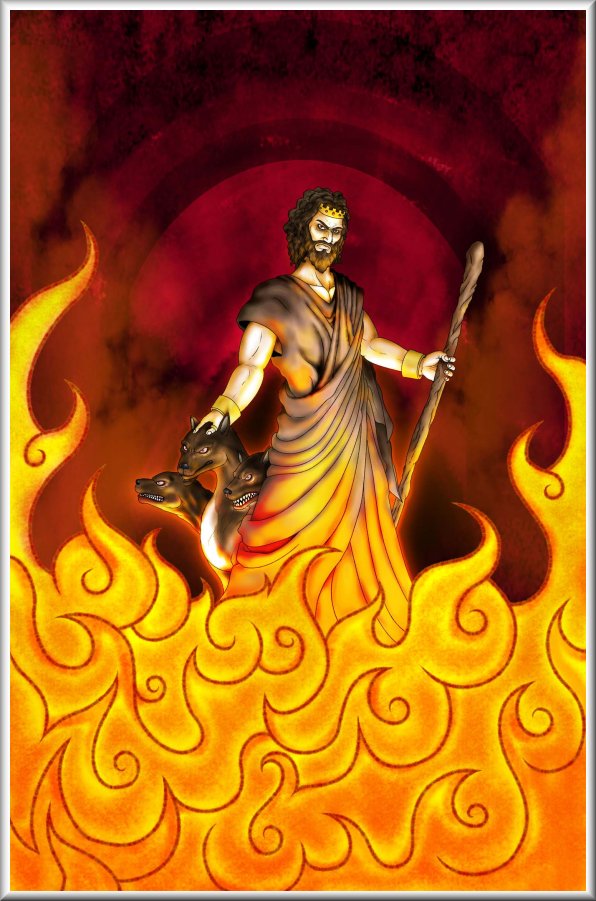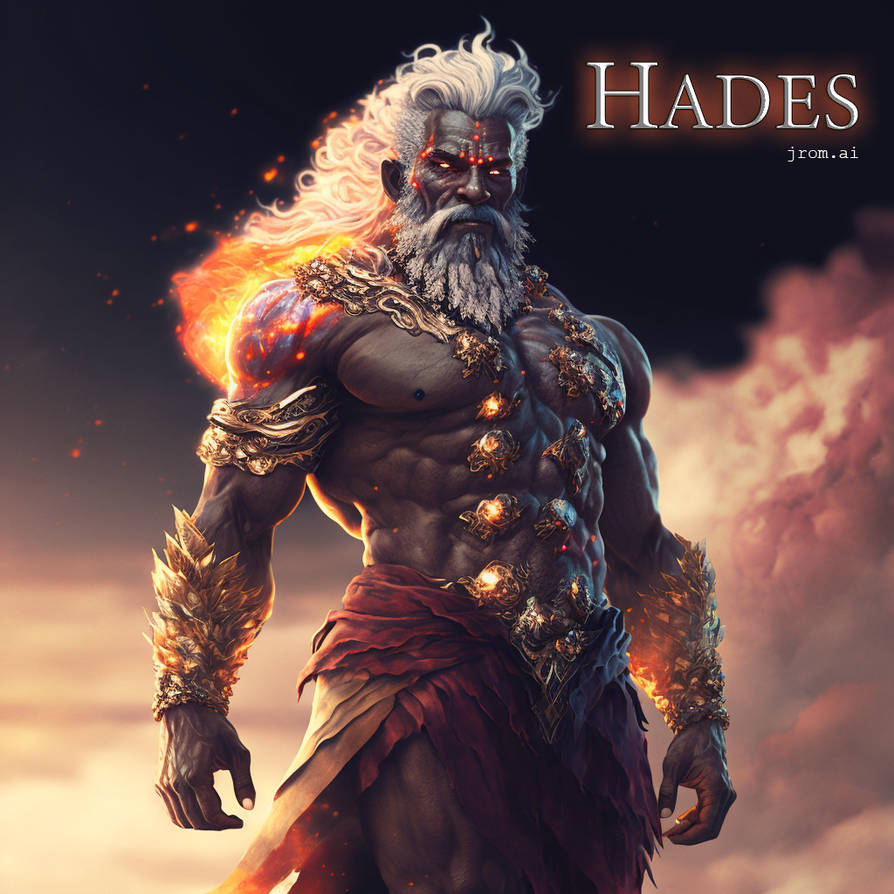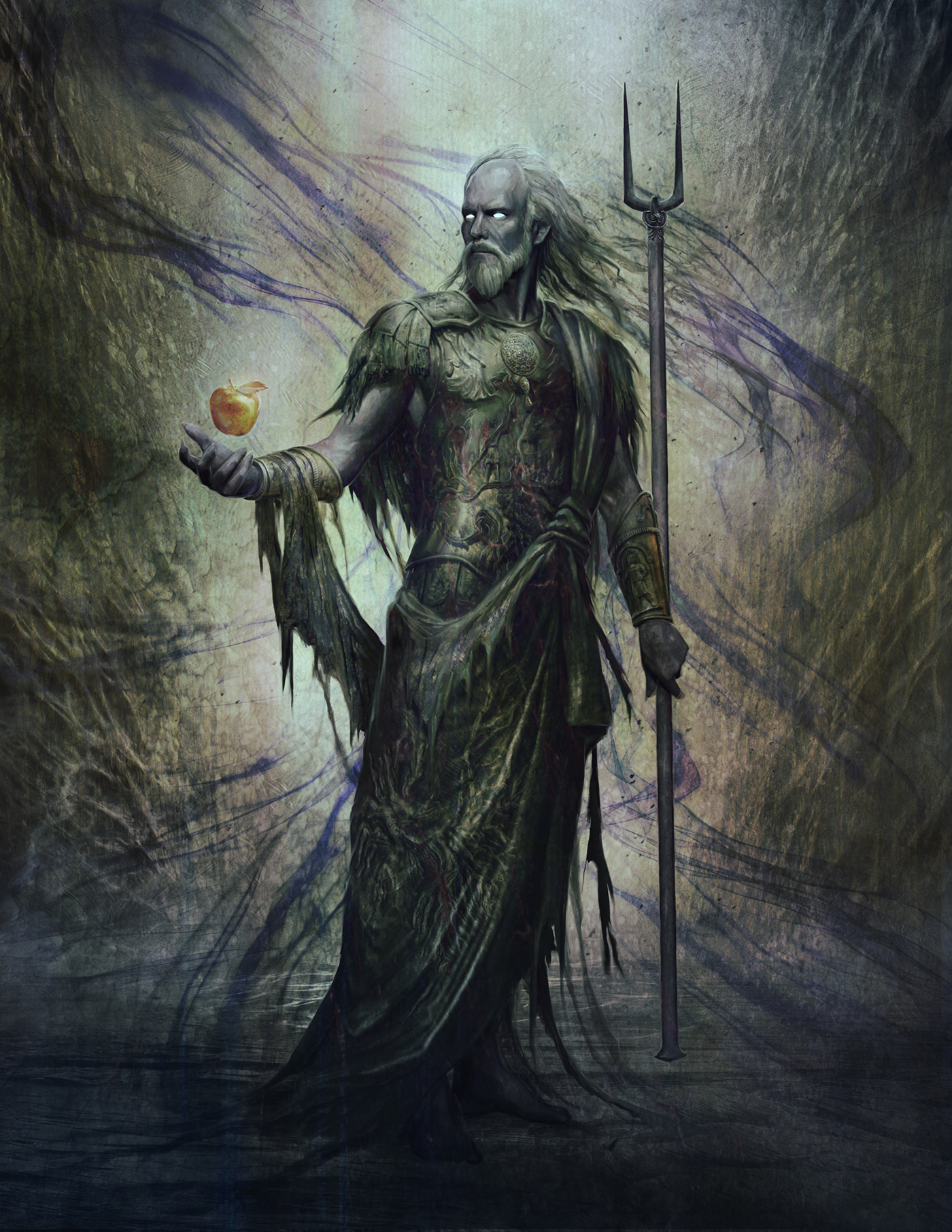Hades Siblings
Hades Siblings - The Family of the Underworld King
When we think about the ancient Greek gods, some figures definitely stand out more than others, and Hades, the ruler of the underworld, is certainly one of them. His name, you know, has become pretty much a direct stand-in for the shadowy place he oversees, a spot below the earth where souls go after their time on the surface is done. But beyond his famous job description, there’s a whole family story connected to this powerful deity, a lineage that ties him to some of the most well-known figures in the entire Greek pantheon.
It's almost like a family business, in a way, with each sibling getting a very distinct part of the cosmos to manage. These family connections, honestly, tell us quite a bit about how the ancient Greeks pictured their world and the forces that shaped it. Hades wasn't just some solitary figure, you see; he was part of a very important group, a set of brothers and sisters who, together, held immense sway over the sky, the sea, and the earth itself.
So, if you've ever wondered who else was in this divine family, or how Hades fits into the bigger picture of these powerful beings, you're in the right place. We're going to take a closer look at the key individuals who shared parents with the lord of the dead, exploring their roles and how their stories, you know, sometimes intertwined with his. It’s a chance to get to know the powerful relatives of the underworld’s king, and perhaps, see them in a slightly different light.
Table of Contents
- Who is Hades, really?
- Hades - A Divine Profile
- How did Hades become King of the Underworld?
- Who are Hades' Siblings?
- What Other Figures Reside in Hades' Siblings' Domain?
- Was Hades Always Feared by his Siblings and Mortals?
Who is Hades, really?
Hades was, first and foremost, the god connected with the concept of death. He was the one who held sway over the underworld, and indeed, his very name became, you know, pretty much interchangeable with that shadowy place. It was his territory, the final stop for all living things once their time was up, a spot that many people, honestly, tried not to think about too much.
But, as a matter of fact, Hades wasn't just about the end of life; he also had a connection to something else entirely: wealth. This particular side of his character, over time, grew to be a bit separate from his initial identity, and it eventually blended with the Greek god Hades, creating a more complete picture of who he was. He was, in some respects, seen as the master of what lay hidden beneath the earth, including all the precious metals and jewels found there.
This idea of him being connected to riches is that it was often linked to Pluto, who was also a lord of the subterranean world. So, you know, the two figures kind of merged, giving Hades this dual aspect of overseeing both the departed and the hidden treasures of the earth. He was, therefore, a figure of both dread and, perhaps, a certain kind of abundance, depending on how you looked at it.
There was this one story, for example, where Hades, quite firmly, would not let Heracles take Cerberus, even after Heracles had managed to defeat the creature without using any weapons. Heracles, being understandably upset, shot Hades with an arrow. This shows, I mean, that even the ruler of the underworld could be challenged, and that he had a very strong will when it came to his possessions and his domain.
Hades - A Divine Profile
| Aspect | Detail |
|---|---|
| Primary Role | God of the Underworld and the Departed |
| Additional Role | God of Hidden Wealth |
| Roman Name | Pluto |
| Parents | Cronus and Rhea |
| Siblings | Zeus, Poseidon, Demeter, Hera, Hestia |
| Spouse | Persephone |
How did Hades become King of the Underworld?
Hades came into being as one of the children of the powerful Titans, Cronus and Rhea. His birth was part of a very dramatic family saga, one that involved a struggle for control over the cosmos itself. Cronus, you see, had a habit of swallowing his children as soon as they were born, a rather extreme measure he took to prevent any of them from overthrowing him, just as he had done to his own father.
So, naturally, Hades was one of these children who ended up inside his father. He, along with his brothers and sisters, spent a period of time in this rather unusual confinement. It was, in a way, a very strange start for someone who would later rule over such a vast and shadowy domain. This early experience, I mean, must have shaped his character, being held captive by his own parent.
The turning point came when Zeus, his younger brother, managed to escape this fate. Zeus, with the help of his mother Rhea, grew up in secret and eventually returned to challenge his father. First, Zeus made Cronus bring up the other children he had swallowed – Hestia, Hera, Demeter, Hades, and Poseidon. This act, you know, freed them all and set the stage for a massive conflict, often called the Titanomachy, a huge war between the younger gods, the Olympians, and the older generation of Titans.
After the Olympians won this significant battle, they divided up the various parts of the cosmos among themselves. Hades, as a matter of fact, was given control over the underworld. This wasn't a random choice; it was his assigned area of influence following the great war. So, his position as the king of the departed and the ruler of the shadowy place below the earth was, in a way, a direct result of this cosmic family struggle and the subsequent distribution of power.
Who are Hades' Siblings?
Hades was, in fact, part of a very significant group of siblings, all of whom were children of the Titans Cronus and Rhea. This means he shared a direct family connection with some of the most prominent and powerful deities in the Greek stories. He had, you know, three older sisters, Hestia, Demeter, and Hera, as well as two brothers, Zeus and Poseidon, who were also incredibly influential figures in the divine hierarchy.
This group of six, often called the Olympian siblings, were the ones who overthrew their father, Cronus, and established a new order in the cosmos. Their shared experience of being swallowed and then freed by Zeus, honestly, created a bond among them, even if their personalities and responsibilities varied greatly. They were, in some respects, the founding members of the new divine government, each taking on a crucial role in the world.
So, when we talk about Hades, it's important to remember that he wasn't just an isolated ruler of the dead. He was, actually, a brother to the king of the gods, the lord of the seas, and the goddesses of the hearth, harvest, and marriage. This familial network, you know, meant that even the ruler of the underworld had ties to the very top of the divine structure, influencing and being influenced by his powerful relatives.
Zeus - The Sky's Ruler and Hades' Siblings
Zeus, as many people know, was the king of the gods, the one who held dominion over the sky and thunder. He was Hades' brother, and, you know, a pretty central figure in the whole family saga. It was Zeus, after all, who forced Cronus to bring up their siblings, an act that literally brought Hades back into the light, so to speak, from the inside of their father.
Their relationship was, like, quite important for the structure of the cosmos. Zeus took the sky, Poseidon the sea, and Hades the underworld. This division, in a way, solidified their individual powers and their collective rule. Even though Hades was assigned to the shadowy place, his connection to Zeus meant he was still very much part of the main divine family, not some distant, forgotten relative.
There's also the connection through Persephone, Hades' wife, who was the daughter of Zeus and Demeter. This means that Hades, in a very direct sense, was married to his niece, which, you know, was not uncommon in these ancient stories. This familial tie, honestly, brought Hades into closer contact with the affairs of the upper world, even if he preferred his own domain.
Poseidon - Master of the Seas and Hades' Siblings
Poseidon was the brother who gained control over the vast and ever-moving waters. He was, you know, the lord of the seas, of earthquakes, and of horses. Like Hades and Zeus, he was swallowed by Cronus and later freed, sharing that very unique and traumatic early experience with his brothers and sisters. His domain was, like, as different from Hades' as could be, yet they were fundamentally linked by their shared past.
The three brothers, Zeus, Poseidon, and Hades, represented the three major divisions of the cosmos. This division of power, you see, meant that while they ruled separate territories, they were still bound by their shared history and their collective role in maintaining the order of the world. Poseidon, with his wild and unpredictable nature, was a striking contrast to the more somber Hades, but they were family nonetheless.
Their connection was, in some respects, a symbol of the balance of power in the universe. The sky, the sea, and the underworld, all ruled by brothers who had endured the same initial challenge. This dynamic, you know, really shows how deeply intertwined the fates of these powerful Hades siblings were, even when their individual responsibilities pulled them in very different directions.
Demeter - Earth's Giver and Hades' Siblings
Demeter was the goddess of the harvest and agriculture, a very important figure for the sustenance of life on earth. She was, actually, one of Hades' older sisters, also a child of Cronus and Rhea. Her role was, like, to ensure the fertility of the land, providing food and abundance, which is quite a contrast to her brother's association with the end of life.
Her most famous daughter was Persephone, who, you know, became Hades' wife. This connection created a rather intense family drama, as Hades abducted Persephone and then tricked her into staying in the underworld for part of the year. This event, honestly, highlights the deep and sometimes difficult relationship between Hades and his sister, Demeter, whose grief over her daughter's absence directly affected the seasons on earth.
So, in a way, Demeter's story is very much tied to Hades' own, showing how the actions of one powerful deity could have, like, widespread effects across the entire world. Her role as a mother, and her struggle to get her daughter back, truly emphasizes the human-like emotions that even these powerful Hades siblings could experience, making them feel a bit more relatable.
Hera - Queen of the Gods and Hades' Siblings
Hera was another of Hades' older sisters, and she held a very prominent position as the queen of the gods and the goddess of marriage and childbirth. She was, you know, the wife of Zeus, making her the most powerful female deity on Mount Olympus. Her story often involves her jealous nature and her various conflicts with Zeus's many affairs, but her family connection to Hades is clear.
As one of the children swallowed by Cronus and then freed, Hera shared that foundational experience with her siblings, including Hades. This common past, in a way, formed a bond, even if their daily duties and spheres of influence were quite different. She represented the more formal and regal aspects of the divine family, overseeing the institution of marriage, which is, like, a far cry from the shadowy underworld.
Her presence in the family of Hades siblings reminds us that even the ruler of the dead was part of this very influential and, honestly, sometimes tumultuous divine household. She was, basically, a direct relative to the lord of the underworld, connecting him to the highest echelons of the Olympian order, showing that even the most feared gods had family ties.
Hestia - Keeper of the Hearth and Hades' Siblings
Hestia was the eldest of the Hades siblings, and she held a unique position as the goddess of the hearth, home, and family. She was, you know, known for her quiet and peaceful nature, often choosing to remain at home rather than getting involved in the frequent disputes of the other gods. Her role was, in a way, foundational, representing the warmth and stability of domestic life.
Like her brothers and sisters, she too was swallowed by Cronus and later brought back into the world by Zeus. This shared beginning connects her directly to Hades, even though their domains were, like, polar opposites. Hestia represented the warmth and safety of the home, while Hades oversaw the cold and permanent resting place of the departed. It's a striking contrast within the same family.
Her presence among the Hades siblings highlights the sheer diversity within this powerful family. While some were involved in grand battles and dramatic affairs, Hestia chose a path of quiet devotion to the home. This shows, you know, that even among the most powerful beings, there was a wide range of personalities and chosen responsibilities, making the family dynamics quite rich.
What Other Figures Reside in Hades' Siblings' Domain?
Beyond Hades himself, the underworld was, actually, home to several other important figures, some revered and some, you know, quite dreaded by the people of ancient times. These beings were part of the very fabric of the shadowy place, helping Hades in his duties or simply existing within his vast territory. It was, in a way, a whole ecosystem of otherworldly beings.
First and foremost among these was Hades' queen, Persephone. She was the daughter of Zeus and Demeter, and her myth tells the very important story of how Hades took her to the underworld and then, you know, used a trick to keep her there for part of each year. Her presence meant that the underworld had a queen, someone to share the rule with Hades, and she was, basically, a vital part of its structure.
Then there was Charon, the ferryman of the departed. His job was, like, to transport the souls of the deceased across the river Styx, a crucial step in their journey to the afterlife. Without Charon, souls couldn't reach their final destination, making him a very important, if somewhat grim, figure in the underworld's operations. He was, in some respects, the first face many souls would see upon entering Hades' domain.
Also dwelling in the underworld were the Erinyes, often called the Furies. Born from the blood of Uranus, the primordial god of the sky, these beings were, you know, often thought to live in the underworld, alongside Hades and his queen. They were responsible for pursuing and punishing those who committed terrible crimes, especially against their own family, bringing a sense of justice to the shadowy depths.
And then there was Tartarus, a dark, primordial landscape located even deeper below the earth than Hades' own domain. It was, in a way, a place of extreme punishment, serving as the home for a small number of very serious sinners and those who were hated enemies of the gods. Zeus, for example, sent his defeated foes there, making it a kind of ultimate prison, even below the underworld itself.
Was Hades Always Feared by his Siblings and Mortals?
Hades was, without a doubt, one of the most feared and formidable deities that ancient Greek stories had to offer. He was the king of the underworld, a place that many called "Hades" as well, and the ruler of the departed. In ancient Greece, people, honestly, seldom dared to even speak his name aloud. If they did, they were often referring to his territory, not necessarily the god himself, which, you know, shows how much respect and apprehension he commanded.
His importance was, in some respects, very fundamental. He was the overseer of the underworld, the one who managed the entire process of the afterlife, while Thanatos was the one responsible for the actual act of dying and guiding souls to their next existence. So, Hades wasn't the cause of death, but rather the administrator of what happened afterward, making him a very significant part of the natural cycle of existence.
He was, basically, a vital part of the natural order of life and its inevitable end. The concept of the "other world," the place beyond the living, was something Hades represented. This made him an important god, not just a figure of dread. He was, you know, the one who ensured that there was a place for souls to go, maintaining balance in the cosmos. His position, therefore, was not just about fear, but also about the necessary order of things.
So, while he might have been one of the most dreaded and fearsome deities, his role was, actually, quite crucial. He incorporated the idea of a destination beyond life, a place where all would eventually arrive. This aspect, you know, made him an indispensable part of the Greek understanding of the universe, and his presence, even if unsettling, was seen as absolutely necessary for the grand scheme of things.

Myth Man's Hades, god of the Underworld

Hades by jrom-ai on DeviantArt

Hades by JasonEngle on DeviantArt